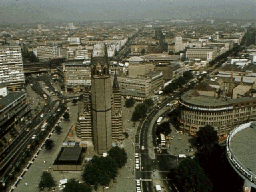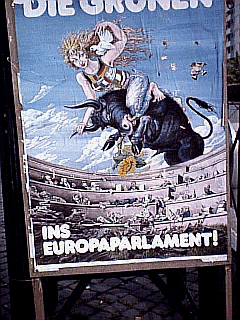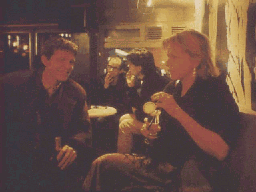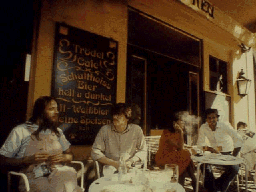

Students found the city exciting. Many came to the Free University, the Technische Hochschule or the Kunsthochschule (Art Academy) and stayed after their studies. Students in Berlin were exempt from service in the Bundeswehr, the West German army. In the late 60's and early 70's, Germany had its domestic troubles, just as we did. Disillusionment with the U.S. mounted steadily as our involvement in Vietnam increased. A large part of the problem was that the West German government dutifully supported American policies.
Student riots were the order of the day, especially at the Free University in West Berlin. On my visit in 1969, practically no window at the Free University was intact,and there were constant trashing actions by student groups along the length of the Kurfuerstendamm, the main shopping thoroughfare in downtown West Berlin.
The most radical of this generation, born just at the end of the war, blamed their parents directly for the Third Reich and tried to extract vengeance very directly, forming revolutionary cells,like the Baader-Meinhof gang. The more constructively minded members of this generation founded the Greens, a West German political party whose main concern is peace, the environment, and the rights of women.

The majority of this generation, now in their forties and fifties,started its long march through the institutions. I credit them with making great changes in German attitudes throughout the last twenty years. What I consider most important is that Germans no longer kow-tow to authority. They seem to have quit barking orders. Self-27 28 32 30 important huffing and puffing seems to be out of fashion. Why should they get upset? There seems to be enough if not plenty for everyone. West Germans are well off. They have money in the bank. The nation has reserves second only to the Japanese. There are social services that give peace of mind. They can hardly be fired. Most have six weeks of vacation. It was recently projected that in ten years, they will be making 150% of what Americans will be making.
A woman can leave a job to have a baby and comeback to the same job six months later, receiving full pay all the while. There are flexible job arrangements. They have health care. They have cars, leisure, vacations. They travel. Prosperity has changed their habits. They dress casually. They are not wild about work. Hardly anything functions on Friday afternoon and they have many holidays. They are tenth on the scale of hours worked per year. (The U.S. is in third place, after the Japanese and the Swiss.) Their problems are the problems of the wealthy, namely discontent and alienation.
Thus Berliners shared in the general upswing of the West German economy. The city was in effect supported to a large degree by the West Germans, who assumed this burden.
 |  |
The arts and cultural life were granted enormous subsidies. During the three decades of the Wall, Berliners maintained the feeling that their city was not just any German city. Berlin stayed alive by persisting in its hope. The arts gained an importance that they had never had in the olden days. Berlin was still a cultural city of the first order and as the popular ad slogan had it, Berlin ist eine Reise wert! --Berlin is worth a trip.
Berlin is a trip, especially if you know some German and can go into a few pubs. They stay open very late, or very early, whichever you want to call it. In mid-June, the sun goes down around nine-thirty or ten at night and comes up at three in the morning. The birds start singing loudly at 2:30 in the morning. I know this from experience.
Proceed to Part 5. East Berlin, a tourist attraction or, switch to another Part:
1. Berlin at the End of WW II
2: The First Postwar Decade
3. The Raising of the Wall
4. West Berlin thrives
6. East Germany during the Wall
7. Bringing down the Wall from within
8. East meets West
9. East German Problems
10. The Road to Unification